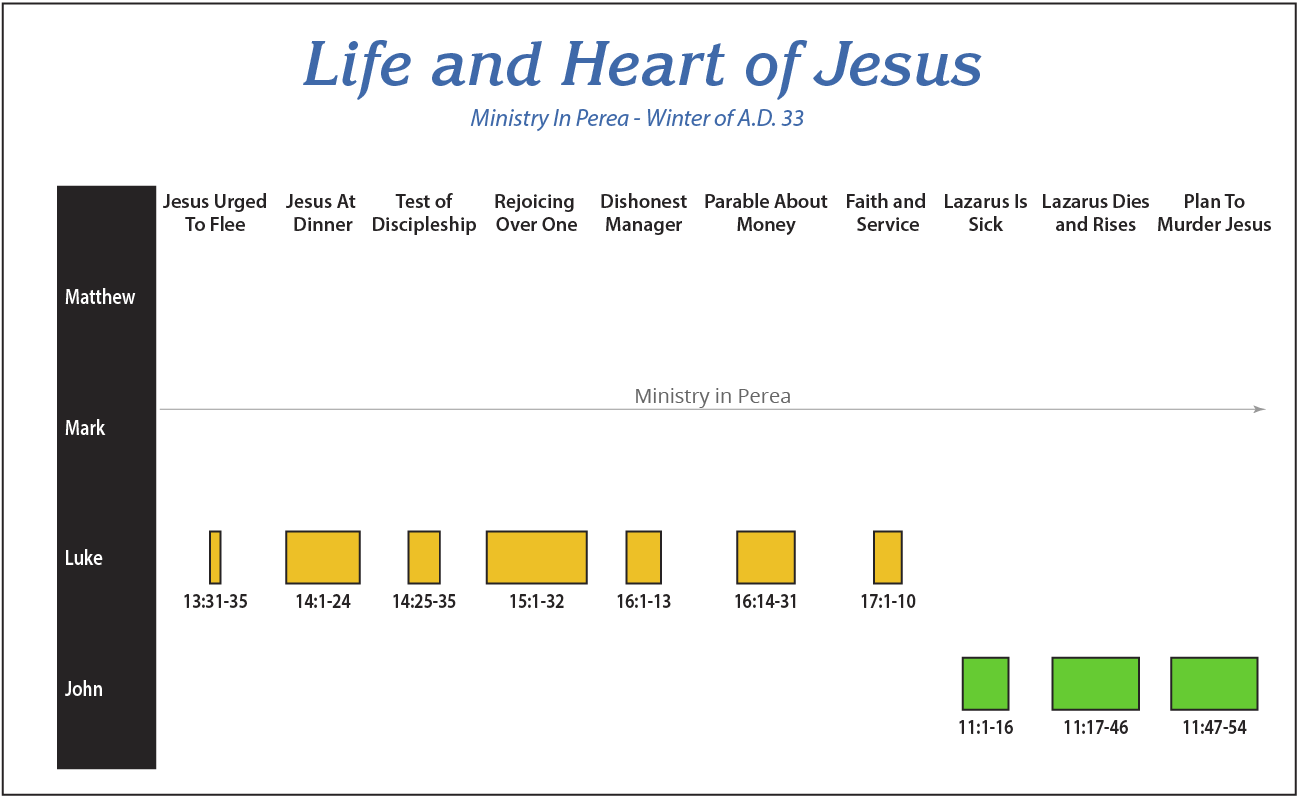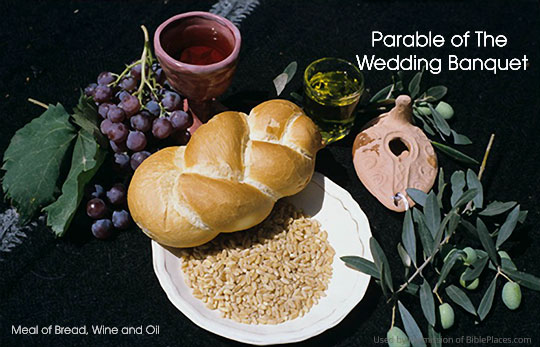
The Pharisees in Jesus’ day were not priests or pastors. They were laymen who organized and controlled the local synagogues. They were highly respected by the Jewish people and were considered to be holy men of God. But Acts 23:6 says that the Pharisees believed in the resurrection of the dead while the Sadducees did not. The Pharisees were more conservative than the Sadducees since they believed that all of the books of the Old Testament were inspired by God. But they were also like the religious cults and the Roman Catholic Church of today because they considered oral traditions to control how the Bible should be interpreted. The gospels reveal that the Pharisees were proud men who wanted others to think they were very spiritual men. In the Sermon on the Mount, we discover that when the Pharisees gave to the poor they would have someone blow a trumpet so others would know that they were giving to the poor (Matthew 6:1-4). They would pray on street corners so others would see them (Matthew 6:5). As a result in Matthew 23, Jesus repeatedly rebuked them for being hypocrites. In this study Jesus rebukes them for a sin that is the root of all sins. Our study comes from Luke 14:1-14.
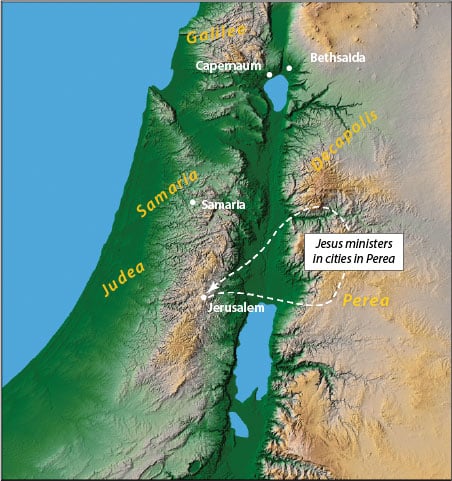
Trap Is Baited With Lunch
In Luke 13:31-35, we were told the Pharisees had warned Jesus that Herod Antipas threatened to murder Him. But we discovered that Herod was actually attempting to motivate Jesus to leave Perea and move to Jerusalem. Also, the Pharisees wanted to motivate Christ to return to Judah where they would have a greater opportunity to finally murder Him. Luke 14:1 helps us to understand that some amount of time had elapsed when we are told in John 14:1-14 that Jesus was invited to a meal. Verse 1 states that it was a Sabbath or a Saturday.
It happened that when He went into the house of one of the leaders of the Pharisees on the Sabbath to eat bread, they were watching Him closely. Luke 14:1 (NASB)
Verse 1 says that Jesus entered the house of one of the leaders of the Pharisees. Possibly he was a member of the Sanhedrin Council. The phrase “eat bread” was a common phrase for eating a meal together. It occurs seventeen times in Scripture and three times in the New Testament (Matthew 15:2; Luke 14:1, 15). Bread was a major portion of a meal. The word “they” indicates that a group of people were present and maybe many Pharisees were among them. However, we do not know who or how many were there.
Verse 2 suggests a reason why Jesus was invited to the meal. The purpose for the invitation was not to establish a relationship with Jesus or to motivate Him to treat them more kindly when He spoke publicly. The reason this event is described is to help us understand the hardness of the hearts of the Pharisees and to motivate us to realize we are proud and should desire to become humble.
And behold, there was a man before him who had dropsy. Luke 14:2 (NASB)
In verse 2 we are told that the Pharisees had asked a man with dropsy to be present. Dropsy is an old medical term for edema. The man had swelling in some part(s) of his body. He had a medical need. This was a trap! Jesus had cast out a demon on a Sabbath early in His ministry (Mark 1:21-34). Then in the third year of His ministry, He healed a man’s withered hand (Luke 6:6-11) on the Sabbath. Jesus also cast a demon out of a woman on a Sabbath so that she would no longer be bent over (Luke 13:10-17). This time they wanted to catch Him healing another person on a Sabbath.
From the Pharisees’ perspective, any healing on the Sabbath was forbidden since it was a work according to their list of religious rules. The Mishnah, an oral tradition, contains a list of tasks that were forbidden on the Sabbath.[1] One of the prohibited tasks or “works” described in the Shabbat section of the Mishnah was “grinding.” According to their view, healing involved “grinding” since the preparation of medicines required grinding.[2] Thus the Pharisees considered Jesus’ acts of healing a violation of their oral law.[3, 4] Therefore, Jesus had been offending them for He was violating their laws and in the process embarrassing them. Consequently, they were looking for more reasons to justify murdering Christ. Apparently, they had asked the man with dropsy to be at the meal. However, it is unlikely that they had asked him to join them for a meal.
To be able to eat a meal with a group of men who had outwardly opposed you and inwardly had wanted to kill you could appear to be a positive sign. But the last part of verse 1 tells us that the Pharisees were watching Him closely. The Greek word for “watching closely” is paratereo. It has the meaning of “to stand beside and watch” and “to watch with evil intent as in Mark 3:2.”[5] This teaches us that the Pharisees were watching to catch Him making a mistake.
They had planned the meal to be the bait to lure Jesus into a trap. They wanted Jesus to heal the man so that they would be justified in finding fault with Him.
Sabbath Laws
We do not know during what part of the day the meal was served. We do not know how long Jesus was there before He spoke. Verse 3 reveals that conversation was in process when Jesus spoke.
And Jesus answered and spoke to the lawyers and Pharisees, saying, “Is it lawful to heal on the Sabbath, or not?” Luke 14:3 (NASB)
Jesus asked a simple question, “Is it lawful to heal on the Sabbath, or not?” Jesus may have been replying to a comment; it is also possible that He changed the subject, but we do not know.
But the Pharisees did not want to reply because verse 4 states that they did not answer.
But they kept silent. And He took hold of him and healed him, and sent him away. Luke 14:4 (NASB)
The Greek text indicates the Pharisees actually refused to speak. Most likely they had agreed in advance to not speak since they expected that Jesus would ask some difficult and embarrassing questions just as He had done before when He healed a man’s withered hand on a Sabbath (Matthew 12:9-14; Luke 6:6-11). Whatever their reason, they said nothing.
On that occasion Jesus had asked if a lamb fell into a pit on the Sabbath, would not the owner rescue the sheep, even though it was the Sabbath?[6] Then He commented that a man was more valuable than sheep. This time Jesus increases the urgency and importance of the situation by replacing the sheep with a man’s son.
And He said to them, “Which one of you will have a son or an ox fall into a well, and will not immediately pull him out on a Sabbath day?” And they could make no reply to this. Luke 14:5-6 (NASB)
Jesus’ point is simple. When there are urgent situations, the Sabbath rules need to be broken. As Christians we must remember that in Hebrews 10:23-25 we are commanded to regularly attend church. One of the benefits is to encourage others in the faith and be encouraged ourself.
Let us hold fast the confession of our hope without wavering, for He who promised is faithful; and let us consider how to stimulate one another to love and good deeds, not forsaking our own assembling together, as is the habit of some, but encouraging one another; and all the more as you see the day drawing near. Hebrews 10:23-25 (NASB)
Jesus was not trying to tell the Pharisees that they had the freedom to attend the synagogue on the Sabbath when they felt like it. Nor was Jesus trying to tell us that church was optional. Some believe that Christians should not feel shame for missing church. Sadly, they miss the command in Hebrews 10:23-25. Serious Christians will faithfully want to please God the Father and worship Him on Sunday. Jesus’ message to the Pharisees that when emergencies occur, God wants us to care for the individual in need or in crisis.
Early in Jesus’ ministry He had said that man was not made for the Sabbath.
Jesus said to them, “The Sabbath was made for man, and not man for the Sabbath.” Mark 2:27 (NASB)
The Pharisees had created a large number of rules for people to keep on the Sabbath. Some Christians misunderstand the definition of legalism as being a list of rules that cannot be found in the Bible. While it is true that legalism does include rules that cannot be found in the Bible, legalism is better defined as rules that supposedly help someone gain eternal life. The Pharisees had convinced themselves that their rules would prevent someone from disobeying one of God’s commandments. Their rules supposedly provided protection against displeasing God. Therefore, they believed the oral traditions were essential to gaining eternal life. Consequently, they believed Jesus was wrong in what He believed and was a threat. Their religious system was in danger of collapse. But how did they respond to the obvious need to be compassionate when a son’s life is at risk on the Sabbath? Once again Jesus embarrassed them. Therefore, they kept silent. We can imagine that the feelings of embarrassment quickly changed to anger. But they did not realize that the situation was only going to become worse. Jesus was going to share an embarrassing parable.
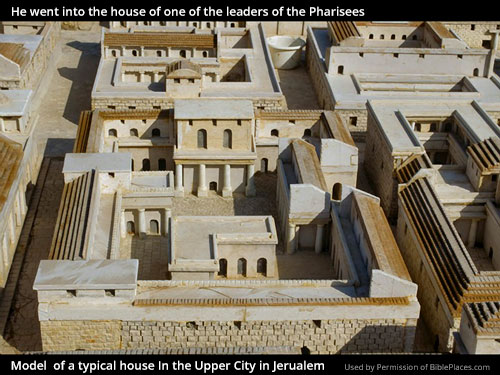
Parable of the Wedding Feast
Jesus’ parable was about a wedding feast.
And He began speaking a parable to the invited guests when He noticed how they had been picking out the places of honor at the table, saying to them . . .” Luke 14:7 (NASB)
If Jesus assumed that the banquet seating for the parable was in a large house, then the chief or best seats would have been on a raised platform. Most likely the leader of the Pharisees would have had a large house. If true, then Ralph Gower’s description of the banquet is helpful for us to understand seating arrangement.
In large houses there was a raised platform for the “top table” where honoured guests would be received (Matthew 23:6; Luke 14:8-10). The chief guest sat on the right-hand side of the host and the second guest on the left-hand (see Mark 10:35-37). The largest and best plates of food were always given to such guests. In early, Old Testament times guests usually sat on their feet, cross-legged on a carpet, but by the time the kingdoms of Israel and Judah were established, guests sat at tables on chairs or even on couches. By New Testament times the triclinium was beginning to come into use. This was an arrangement of three tables set around a square, with access to the middle gained through the open side of the square so that servants could come and go to bring food and to take away the leftovers. Couches were arranged on the outside of the three tables, close to one another, so that the guests could recline to eat. The guest was given a cushion and lay on his left arm with his head towards the table, leaving his right arm free to take what he fancied. This made it possible for servants to rinse the feet while the guests continued the banquet.[7]
Since only three tables were used along the sides of the square, this means the tables and guests formed a “U.” At the bottom of this “U” was an elevated platform for the “more important guests.”[8]
We are told that as Jesus was speaking, He noticed the invited guests were picking the best seats of honor. The Greek word that is translated as “places of honor at the table” is protoklisia. Protoklisia is a compound word composed of protos which means “first” and klisia which means “seats.” Thus the guests were trying to choose the first or best seat. Since the best seats were next to the host’s seat, we can imagine the men moving quickly to the better seats and sitting down quickly while trying to appear dignified.
Thus while the guests were scrabbling for the best seats at the triclinium, Jesus continued with the parable.
When you are invited by someone to a wedding feast, do not take the place of honor, for someone more distinguished than you may have been invited by him . . . Luke 14:8 (NASB)
His first statement must have surprised the guests, “When you are invited by someone to a wedding feast, do not take the place of honor, for someone more distinguished than you may have been invited by him.” Jesus was tactful. Jesus had not been invited to a wedding feast, but He softened the rebuke by referring to a wedding feast. He warned them to not take the places of honor on the left or right sides of the host that they thought they deserved or wanted. This suggests that the distinguished guests had not already sat down in the place of honor that had been selected by the host. The Greek word for “more distinguished” is entimos. It can also be translated as “valuable, precious, honored and highly regarded.” That is, Jesus was saying someone more highly regarded than they were present and had not yet been offered their places of honor.
. . . and he who invited you both will come and say to you, “Give your place to this man,” and then in disgrace you proceed to occupy the last place. Luke 14:9 (NASB)
Anyone who has ever sat down in a seat in a seminar or at a banquet and then has been told to move so that someone else could take his or her seat knows the embarrassment that occurs. Proverbs 25:6-7 summarizes the experience.
Do not claim honor in the presence of the king,
And do not stand in the place of great men;
For it is better that it be said to you, “Come up here,”
Than for you to be placed lower in the presence of the prince,
Whom your eyes have seen.
Proverbs 25:6-7 (NASB)
Proud men seek the best for themselves, but the humble leave the best for others. The humble leave the best slice of pie or piece of meat on the serving dish. These Pharisees were proud men and they proved it by their behavior.
Then Jesus concluded the parable with a recommendation.
But when you are invited, go and recline at the last place, so that when the one who has invited you comes, he may say to you, “Friend, move up higher”; then you will have honor in the sight of all who are at the table with you. Luke 14:10 (NASB)
His recommendation is obvious. He said avoid embarrassment by selecting the last place. Select the place no one else wants. But who would ever want to sit in the last place? But that is His point. That is the mark of humility. Humble yourself and if the host invites you to move up to the most honored place, then you will be surprised and receive honor.
For everyone who exalts himself will be humbled, and he who humbles himself will be exalted. Luke 14:11 (NASB)
Humble And Exalted
Jesus concluded the parable with a principle. The humble will be exalted and the proud will be humbled. Frequently, Jesus taught that the last would be first and the first would be last. All of the Beatitudes in Matthew 5:3-11 require someone who is humble. The proud will never be poor in spirit. The proud are not peacemakers unless they receive some benefit from it. Humility is one of the primary characteristics of a Christian. Philippians 2:8 teaches that humility was a divine attribute of Jesus Christ. Jesus proved He was humble when He died on the cross for us while were sinners and enemies (Romans 5:8-10). We should have been on that cross and not Him. Figuratively speaking, He was in the “last place” while we thought we were in the “first place.”
Being found in appearance as a man, He humbled Himself by becoming obedient to the point of death, even death on a cross. For this reason also, God highly exalted Him, and bestowed on Him the name which is above every name, so that at the name of Jesus EVERY KNEE WILL BOW, of those who are in heaven and on earth and under the earth, and that every tongue will confess that Jesus Christ is Lord, to the glory of God the Father. Philippians 2:8-11 (NASB)
Then Philippians 2:9-11 reveals that God the Father exalted Him. Figuratively speaking, Jesus was invited to the “place of honor” at the head of the banquet table.
The first sins committed by Satan and Eve were pride. Pride is the root of all sin and from that sin all others flow. A person will not become a Christian if they are proud, for Jesus said that He came to save sinners and not the righteous (Luke 5:32). Those who consider themselves to be good people proudly see themselves as being righteous. That describes the Pharisees. They thought they were the good people. The proud want the best. How did the Pharisees respond to Jesus’ parable? We are not told.
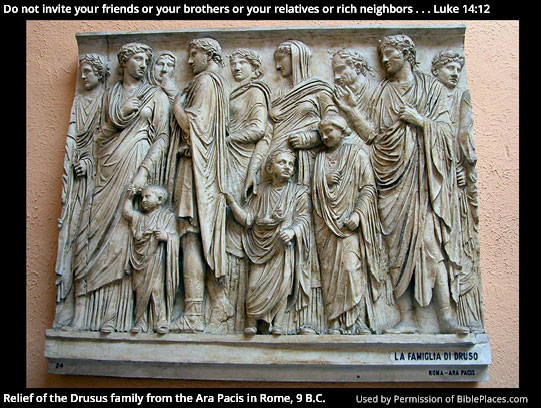
Instructions To The Host
Then Jesus spoke directly to the host of the banquet.
And He also went on to say to the one who had invited Him, “When you give a luncheon or a dinner, do not invite your friends or your brothers or your relatives or rich neighbors, otherwise they may also invite you in return and that will be your repayment.” Luke 14:12 (NASB)
The Greek word that Jesus used for “luncheon” is ariston. The word refers to the minor meal of the day. Therefore, it could refer to breakfast or lunch. The Greek for “dinner” is deipnon, which speaks of the main meal of the day. Therefore, it could refer to the dinner, supper or a banquet.[9] If you are the host and you invite people to a meal, Jesus said do not invite family members or your rich neighbors. Instead, invite those who cannot afford to return the invitation. Then He added, “That will be your repayment.” The literal Greek word for repayment is “the thing paid back.” This is not a reward, but payment for what was due. If the person invites you for a meal, that is the repayment.
Now for a question. How often do you expect others to do the same thing that you do for them? You give them a gift. Therefore, you expect them to give you a gift. Imagine, giving someone a Christmas gift and the one who was given the gift never gives you a gift or says thank you? Or, you invite someone to lunch and pay for their meal repeatedly, but they never offer to pay for your meal. Jesus is encouraging us to invite people to a meal who cannot do the same for us. It is a test of one’s humility.
Now Jesus gives us examples of the type of people we should invite. If you were thinking of inviting some family members or a friend who did not have much money, you still missed the message. The next two verses share the type of person He was thinking about inviting for a meal.
But when you give a reception, invite the poor, the crippled, the lame, the blind, and you will be blessed, since they do not have the means to repay you; for you will be repaid at the resurrection of the righteous. Luke 14:13-14 (NASB)
Jesus’ list of people are the crippled, lame and blind. We could add those who are deaf, cannot speak or those who are paralyzed in their bodies. We could add some other people who are very poor. Maybe the homeless? I remember inviting a homeless man into a fast food restaurant and paying for his meal. Then I shared with him that Christ had died for his sin and how to become a Christian.
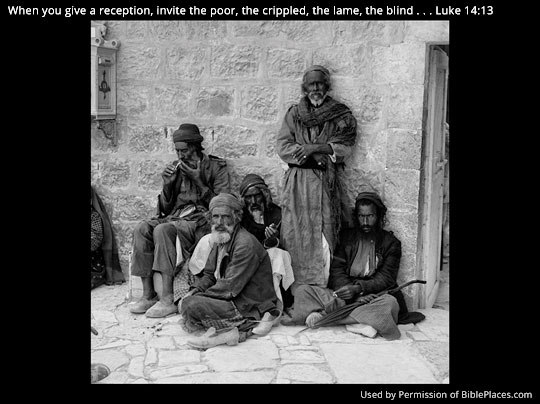
Yes, Jesus was serious when He said to invite those who cannot repay you. But the people chosen for His illustration were also people the Pharisees did not want to be near. For example, consider the time that Jesus shared a meal with tax collectors and “sinners.” The event is recorded in Matthew 9.
Then it happened that as Jesus was reclining at the table in the house, behold, many tax collectors and sinners came and were dining with Jesus and His disciples. When the Pharisees saw this, they said to His disciples, “Why is your Teacher eating with the tax collectors and sinners?” Matthew 9:10 -11 (NASB)
The Pharisees were upset that Jesus spent time with people whom they considered to be undesirable.
Jesus’ point was the proud will not do this unless they have something to gain. Politicians are a good example of those who have something to gain. It is common to see them spending time with the poor. They create a photo opportunity that looks great in news reports and on television. They set up the situation and notify the news reporters. This supposedly kindhearted politician is seen caring for the poor. It is all a fraud. Some church leaders go to the rescue missions because they hope others will think they are spiritual. I wonder how many Christians would go to the rescue missions or visit the poor in foreign countries if no one else knew? Humble people do not look for rewards.
Conclusion
Do you think Jesus was trying to condemn the Pharisees with His parable or was He attempting to motivate them to examine themselves and repent? His illustration was excellent and His principle of “For everyone who exalts himself will be humbled, and he who humbles himself will be exalted” was correct. He wants you to examine yourself and discover your pride. Someone has said, “Pride is concerned with who is right, but the humble is concerned with what is right.” That is, pride focuses on others, but humility does what is right. Jesus told us what is right and the humble will do it. The proud will object and find an excuse because they think they are better!
Jesus is the perfect example of humility. He humbled Himself by taking on human form and dying on a cross in order to save us from our sins. We could not and will not ever be able to pay Him back. Romans 5:8 said He died for us who are sinners and Romans 5:10 calls us enemies of God. Yet, He died for us who are spiritually crippled, lame and blind. Jesus’ parable calls us to humility and to care for others.
This incident also reveals the hatred of the Pharisees for Christ. Most of them rejected Christ and had Him murdered. They were proud people. Proud people rejected Christ because they thought they are better than He was!! Are you proud or humble? If you are humble, then your next step is to become a Christian by believing in Jesus Christ and accepting Him as Lord and Savior.
For God so loved the world, that He gave His only begotten Son, that whoever believes in Him shall not perish, but have eternal life. John 3:16 (NASB)
References:
1. Mishnah. Shabbat. 7.2. This section provides a list of thirty-nine prohibited tasks: to sow, to plow, to reap, to bind sheaves, to thresh, to winnow, to select unfit produce or crops, to grind, to sift, to knead, to bake, to shear wool, to wash, to beat, to dye, to spin, to weave, to make two loops, to weave two threads, to separate two threads, to tie, to untie, to sew two stitches, to tear in order to sew two stitches, to hunt a deer, to slaughter it, to skin it, to salt it, to cure its hide, to scrape it, to cut it, to write two letters, to erase two letters in order to write two letters, to build, to tear down, to put out a fire, to light a fire, to strike with a hammer, to transport an object from one place to another. Mishnah Avot also contains many prohibitions on the Sabbath.
2. David Stern. Jewish New Testament Commentary. Jewish New Testament Publications. 1992. p. 117.
3. “The Sanhedrin therefore legislated to forbid the use of all non-vital medicines and treatments except for a sick person.” by Orthodox Union (www.ou.org/holidays/the_thirty_nine_categories_of_sabbath_work_prohibited_by_law/)
4. Talmud – Shabbat 53b; Orach Chaim 327:1 with Mishnah Berurah 1; 39 Melochos, p. 475; Halachos of Shabbos, XII:D.3 (p. 218).
5. A. T. Robertson, Word Pictures in the New Testament. Baker Book House. 1930. vol. 2. p. 194.
6. Shabbath 128b. Babylonian Talmud.
7. Ralph Gower. The New Manners and Customs of Bible Times. Moody Publishers. 2005. pp. 222-223.
8. Walter L Liefeld. Luke. The Expositor’s Bible Commentary. Regency Reference Library. Zondervans. 1984. vol. 8. p. 976.
9. B. Klappert, “Lord’s Supper,” ed. Lothar Coenen, Erich Beyreuther, and Hans Bietenhard, New International Dictionary of New Testament Theology. Regency Reference Library. 1971, vol. 2, p. 520.
Questions or Comments?
